Wendland is a region in Germany on the borders of the present states of Brandenburg, Mecklenburg-Western Pomerania, Lower Saxony and Saxony-Anhalt.
Wendland may also refer to:
Wendland is a region in Germany on the borders of the present states of Brandenburg, Mecklenburg-Western Pomerania, Lower Saxony and Saxony-Anhalt.
Wendland may also refer to:

Lower Saxony is a German state in northwestern Germany. It is the second-largest state by land area, with 47,614 km2 (18,384 sq mi), and fourth-largest in population among the 16 Länder federated as the Federal Republic of Germany. In rural areas, Northern Low Saxon and Saterland Frisian are still spoken, albeit in declining numbers.

A Regierungsbezirk means "governmental district" and is a type of administrative division in Germany. Currently, four of sixteen Bundesländer are split into Regierungsbezirke. Beneath these are rural and urban districts
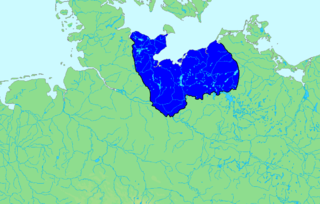
The Obotrites or Obodrites, also spelled Abodrites, were a confederation of medieval West Slavic tribes within the territory of modern Mecklenburg and Holstein in northern Germany. For decades, they were allies of Charlemagne in his wars against the Germanic Saxons and the Slavic Veleti. The Obotrites under Prince Thrasco defeated the Saxons in the Battle of Bornhöved (798). The still-Pagan Saxons were dispersed by the emperor, and the part of their former land in Holstein north of Elbe was awarded to the Obotrites in 804, as a reward for their victory. This however was soon reverted through an invasion of the Danes. The Obotrite regnal style was abolished in 1167, when Pribislav was restored to power by Duke Henry the Lion, as Prince of Mecklenburg, thereby founding the Germanized House of Mecklenburg.

Lüchow-Dannenberg is a district in Lower Saxony, Germany, which is usually referred to as Hanoverian Wendland or Wendland. It is bounded by the districts of Uelzen and Lüneburg and the states of Mecklenburg-Western Pomerania, Brandenburg and Saxony-Anhalt.
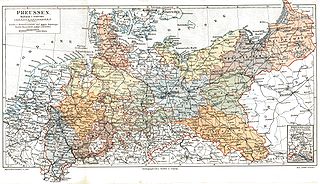
The Provinces of Prussia were the main administrative divisions of Prussia from 1815 to 1946. Prussia's province system was introduced in the Stein-Hardenberg Reforms in 1815, and were mostly organized from duchies and historical regions. Provinces were divided into several Regierungsbezirke, sub-divided into Kreise (districts), and then into Gemeinden (townships) at the lowest level. Provinces constituted the highest level of administration in the Kingdom of Prussia and Free State of Prussia until 1933, when Nazi Germany established de facto direct rule over provincial politics, and were formally abolished in 1946 following World War II. The Prussian provinces became the basis for many federal states of Germany, and the states of Brandenburg, Lower Saxony, and Schleswig-Holstein are direct successors of provinces.

Rebecca Harms is a German politician who served as Member of the European Parliament (MEP) from 2004 until 2019. She is a member of the Alliance '90/The Greens, part of the European Green Party. From 2010 until 2016 she served as president of The Greens–European Free Alliance group in the European Parliament.
Oldenburg may also refer to:
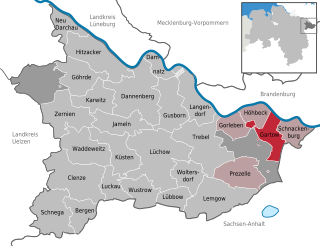
Gartow is a municipality in the district Lüchow-Dannenberg, in Lower Saxony, Germany. It is situated in the easternmost tip of Lower Saxony, not far from the river Elbe, approx. 30 km northeast of Salzwedel, and 20 km west of Wittenberge. Gartow is also the seat of the Samtgemeinde Gartow.
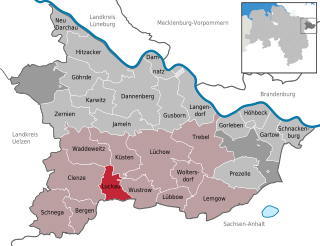
Luckau (Wendland) is a village or Gemeinde (municipality) in the south of the Kreis (local government district) of Lüchow-Dannenberg in Lower Saxony, Germany, where it forms part of the Samtgemeinde (joint municipal association) of Lüchow (Wendland).
Fürstenau may refer to:
Northern Germany is a linguistic, geographic, socio-cultural and historic region in the northern part of Germany which includes the coastal states of Schleswig-Holstein, Mecklenburg-Vorpommern and Lower Saxony and the two city-states Hamburg and Bremen. It contrasts with Southern Germany, Western Germany, and Eastern Germany.
The Vicariate Apostolic of Northern Germany, known for most of its existence as the Vicariate Apostolic of the NorthernMissions, was a Catholic missionary jurisdiction established on 28 April 1667. It belonged to a vicar apostolic in predominantly Protestant Northern Europe.
The Landesliga is a tier of football in some states of the German football league system.
The Free Republic of Wendland was a protest camp established in Gorleben, West Germany, on 3 May 1980 to protest against the establishment of a nuclear waste dump there. On 4 June 1980, the police moved in and evicted the camp.

The Drawehn is a partly wooded and partly agricultural region of hills in the northeastern part of the German state of Lower Saxony, lying between the districts of Lüneburg and Uelzen in the west and Lüchow-Dannenberg in the east.

Wustrower Dumme is a river of the German states Saxony-Anhalt and Lower Saxony. It is a roughly 32 kilometres (20 mi) long, and a left, western tributary of the Jeetzel.
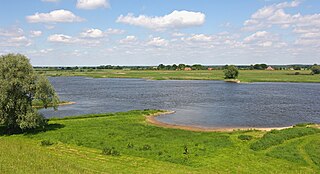
The Wendland is a region in Germany on the borders of the present states of Brandenburg, Mecklenburg-Western Pomerania, Lower Saxony and Saxony-Anhalt. Its heart is the Hanoverian Wendland in the county of Lüchow-Dannenberg in Lower Saxony.
Wendland and Altmark, named after the German regions of Wendland and Altmark, is the name of a natural regional major landscape unit group in Lower Saxony and Saxony-Anhalt, North Germany. In the Handbook of Natural Region Divisions of Germany it is given serial number 86, the Bundesamt für Naturschutz gives the same region the serial number D29.
Luckau is a city in the federal state of Brandenburg, Germany.

There are numerous prehistorical and early historical ringworks and fortification ramparts in Central Europe that have erroneously, usually colloquially, been given the name Schwedenschanze, which means "Swedish redoubt", a schanze being a hastily erected, military fieldwork.